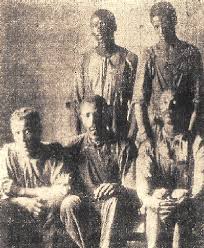Descendants of lynching victim: Don’t assign blame without proof
Published 12:05 am Tuesday, October 17, 2017

- Lynched were Jack Dillingham, seated left; Nease Gillespie, seated right; and John Gillespie, standing right. File photo
SALISBURY — Descendants of a man suspected in the 1906 Lyerly family murders in Rowan County — who was subsequently lynched along with two other men — say they don’t want to see a rush to judgment about a new suspect in the century-old killings.
“The Man From the Train,” a recently released nonfiction book by Bill and Rachel James, traces dozens of ax murders that took place across the country between 1898 and 1912 and connects them to a serial killer they identify as Paul Mueller.
The Jameses say they are certain Mueller killed the Lyerlys — prompting a call to clear the names of lynching victims Nease Gillespie, John Gillespie and Jack Dillingham.
In a statement released over the weekend, Nease Gillespie’s descendants advise caution.
“While we welcome the discovery of any factual information that could identify the killers of the Lyerly family and fully exonerate our family members, we feel that it would be irresponsible to accuse any individuals without concrete evidence of their guilt,” the family statement says.
“It was rampant speculation without facts or evidence which led to the brutal murders of Nease, John and Jack. While the theory is intriguing, it is not evidence and we will not contribute to any narrative that does to another what was done to our family — assign blame without proof.”
Isaac Lyerly, wife Augusta and two of their children died after being attacked with an ax in their farmhouse near Barber Junction on July 13, 1906. Three black sharecroppers among those charged with the crime were dragged from the county jail by an angry white mob. The men were taken to what is now North Long Street, where they were tortured, hanged and shot.
After years of silence on the subject, the Salisbury community held a service to commemorate the men’s deaths just two months ago, on Aug. 6, the anniversary of the 1906 lynchings. Called “A Service of Truth, Healing and Reconciliation,” it came after a panel discussion earlier in the day about the lynchings.
The murder and lynchings were so infamous at the time that children made a game of imitating the crimes — hence the name of Susan Barringer Wells Vaughan’s book, “A Game Called Salisbury.” Vaughan, a distant relative of both Isaac and Augusta Lyerly, extensively researched the murders and the lynchings and concluded there was no evidence that the sharecroppers killed the family.
But, as the James book says, this is the South. “When a terrible crime occurred, people immediately assumed that black people had done it,” James writes.
Vaughan, who lives in Greensboro, learned of “The Man From the Train” when the book’s publishing company contacted her to find out how to pronounce “Barringer.” When she learned the authors had identified a likely suspect — and read their book and accepted its conclusions — she began to look for a way to clear the names of the three lynched men.
They were never convicted, so they cannot be officially exonerated, according to legal authorities. But Vaughan has contacted the Rowan County Sheriff’s Office and the District Attorney’s Office to see if there could be some public or official recognition of the men’s innocence.
Paul Mueller was an itinerant farmhand when he was identified in 1898 as a suspect in the murder of the Newton family for whom he was working at the time in West Brookfield, Massachusetts. He eluded arrest, though, and there followed over the next 14 years a string of similar ax murders, all in homes near railroad tracks, with several more common characteristics.
Mueller, a loner with a heavy German accent and unkempt appearance, was not charged in any of the ax murders.




